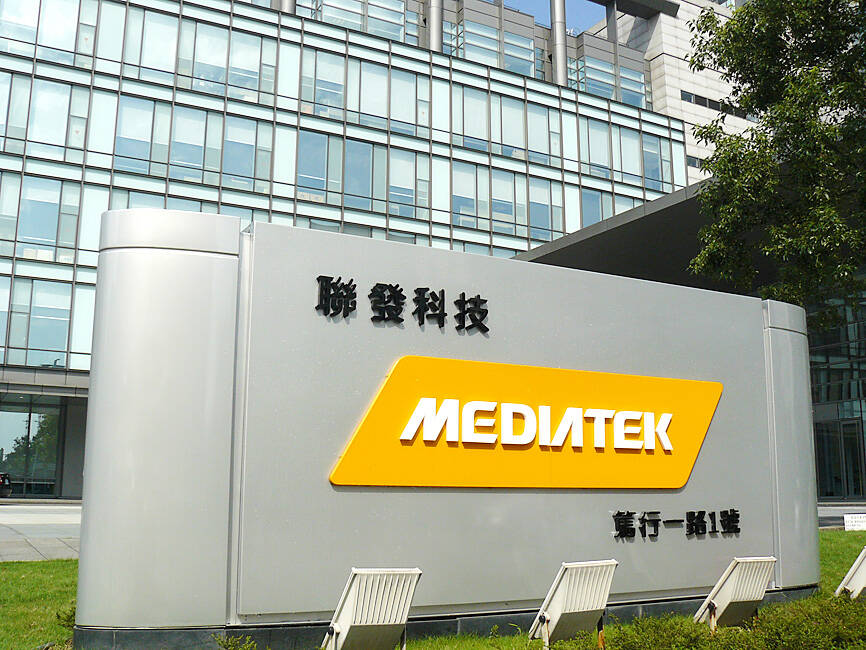MediaTek Inc (聯發科) paid the highest average annual compensation to non-managerial full-time employees of any of Taiwan’s listed companies, according to a report published by Taiwan Stock Exchange Corp (TWSE) yesterday.
MediaTek’s non-managerial employees earned NT$3.754 million (US$115,384) on average last year in total compensation, which includes regular salary and monthly stipends, overtime pay, and irregular income such as bonuses, allowances and profit distributions.
Though the figure was down 22.8 percent from the previous year, MediaTek still ranked first in the category for the third consecutive year, the TWSE said.

Photo: CNA
A total of six listed companies paid non-managerial employees average compensation of over NT$3 million last year, with IC design companies taking four of those places, exchange data showed.
In second place was Novatek Microelectronics Corp (聯詠), with average annual compensation of NT $3.712 million, followed by JSL Construction & Development Co (愛山林) with NT$3.659 million, and Bestec Power Electronics Co (聯德) with NT$3.581 million.
The other two above the NT$3 million threshold were Realtek Semiconductor Corp (瑞昱) with NT$3.149 million and Global Unichip Corp (創意) with NT$3.134 million.
Taiwan Semiconductor Manufacturing Co (台積電), the world’s largest contract chipmaker, saw its average compensation for non-managerial full-time employees fall 10.2 percent to NT$2.842 million last year, ranking seventh, according to the report.
In terms of median compensation, which may provide a more accurate look at overall compensation levels because it eliminates outliers, Bestec led the pack at NT$3.749 million, followed by MediaTek with NT$3.094 million and Novatek with NT$3.028 million.

With this year’s Semicon Taiwan trade show set to kick off on Wednesday, market attention has turned to the mass production of advanced packaging technologies and capacity expansion in Taiwan and the US. With traditional scaling reaching physical limits, heterogeneous integration and packaging technologies have emerged as key solutions. Surging demand for artificial intelligence (AI), high-performance computing (HPC) and high-bandwidth memory (HBM) chips has put technologies such as chip-on-wafer-on-substrate (CoWoS), integrated fan-out (InFO), system on integrated chips (SoIC), 3D IC and fan-out panel-level packaging (FOPLP) at the center of semiconductor innovation, making them a major focus at this year’s trade show, according

DEBUT: The trade show is to feature 17 national pavilions, a new high for the event, including from Canada, Costa Rica, Lithuania, Sweden and Vietnam for the first time The Semicon Taiwan trade show, which opens on Wednesday, is expected to see a new high in the number of exhibitors and visitors from around the world, said its organizer, SEMI, which has described the annual event as the “Olympics of the semiconductor industry.” SEMI, which represents companies in the electronics manufacturing and design supply chain, and touts the annual exhibition as the most influential semiconductor trade show in the world, said more than 1,200 enterprises from 56 countries are to showcase their innovations across more than 4,100 booths, and that the event could attract 100,000 visitors. This year’s event features 17

EXPORT GROWTH: The AI boom has shortened chip cycles to just one year, putting pressure on chipmakers to accelerate development and expand packaging capacity Developing a localized supply chain for advanced packaging equipment is critical for keeping pace with customers’ increasingly shrinking time-to-market cycles for new artificial intelligence (AI) chips, Taiwan Semiconductor Manufacturing Co (TSMC, 台積電) said yesterday. Spurred on by the AI revolution, customers are accelerating product upgrades to nearly every year, compared with the two to three-year development cadence in the past, TSMC vice president of advanced packaging technology and service Jun He (何軍) said at a 3D IC Global Summit organized by SEMI in Taipei. These shortened cycles put heavy pressure on chipmakers, as the entire process — from chip design to mass

SEMICONDUCTOR SERVICES: A company executive said that Taiwanese firms must think about how to participate in global supply chains and lift their competitiveness Taiwan Semiconductor Manufacturing Co (TSMC, 台積電) yesterday said it expects to launch its first multifunctional service center in Pingtung County in the middle of 2027, in a bid to foster a resilient high-tech facility construction ecosystem. TSMC broached the idea of creating a center two or three years ago when it started building new manufacturing capacity in the US and Japan, the company said. The center, dubbed an “ecosystem park,” would assist local manufacturing facility construction partners to upgrade their capabilities and secure more deals from other global chipmakers such as Intel Corp, Micron Technology Inc and Infineon Technologies AG, TSMC said. It